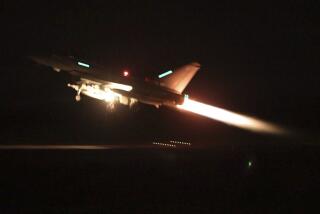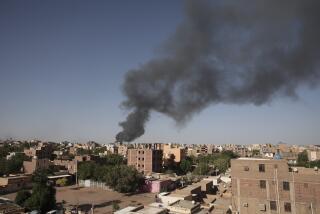U.S. diplomatic posts to reopen except in Yemen and Pakistan
Most of the U.S. embassies and consulates closed this week because of a worldwide terrorism alert will reopen Sunday, though tension remains high and fear of an attack persists, the U.S. State Department said Friday.
Diplomatic posts in Sana, the Yemeni capital, and in the Pakistan city of Lahore will remain closed because of specific threats to those sites, State Department spokeswoman Jen Psaki said in Washington.
Eighteen of the 19 U.S. missions closed as a precaution against credible threats of terrorism against Western interests will reopen after a full weekâs closure on Sunday, the start of the Muslim worldâs work week and the resumption of normal business after the fast month of Ramadan and the Eid al-Fitr holiday that followed.
The U.S. Embassy in Sana will remain closed âbecause of ongoing concerns about a threat stream indicating the potential for terrorist attacks emanating from Al Qaeda in the Arabian Peninsula,â Psaki said.
U.S. intelligence sources have said they recently intercepted communications between AQAP, Al Qaedaâs Yemeni branch, and the networkâs core leader, Ayman Zawahiri, in Pakistan as they were discussing plans for a strike to coincide with the Muslim holidays.
The 15th anniversary of a major Al Qaeda attack on U.S. embassies in Kenya and Tanzania was Wednesday, heightening concern that the terrorist group would attempt to mark the date with another major operation.
Psaki said the consulate in Lahore, which closed Thursday because of a separate credible threat to the facility, will also remain closed.
U.S. authorities will âcontinue to evaluate information about these and all of our posts and to take appropriate steps to best protect the safety of our personnel, American citizens traveling overseas, and visitors to our facilities,â Psaki said.
A tense atmosphere prevailed in Sana, and Yemen officials appeared to be taking unusual precautions despite having criticized the U.S., British and other Western governmentsâ evacuation of diplomatic posts as playing into the hands of terrorists trying to disrupt normal life.
Yemen President Abdu Rabu Mansour Hadi and other officials attended Eid prayers Friday at a mosque within the presidential palace rather than at one of the capitalâs main public mosques, as is tradition.
Residents of the capital were reeling from a barrage of drone attacks, believed to have been carried out by U.S. aircraft, that have killed at least 34 people since July 27. The Associated Press cited unnamed Yemeni government officials as saying that at least seven of the militants killed in the drone strikes were citizens of Saudi Arabia, not Yemen. The men were believed to have crossed the border to bring in money for AQAP or to train in their terrorist groupâs camps.
The constant moan of drone engines overhead and noise from U.S. B3 aircraft flying over Sana are intensifying public anger over the counter-terrorism operations that Yemenis see as an infringement of their sovereignty and a risk to their homes and families, said Ahmed Zurqa, an expert on Islamic militant groups.
The strikes from unmanned aircraft, which have at times killed innocent bystanders as well as terrorism suspects, have damaged Hadiâs image. Many Yemenis see the drone operations as an attempt by U.S. forces to assert power over their country, Zurqa said.
Rashad Mohammed Said, who claimed to have worked for late Al Qaeda leader Osama bin Laden as a driver, spoke during Friday prayers at a Sana mosque and berated Hadi for his visit to Washington last week. The self-styled Bin Laden aide said the Yemeni president had signed agreements that âgave the green lightâ to Washington to conduct military operations in Yemen in the course of its proclaimed global fight against terrorism.
ALSO: Zimbabwe opposition asks court to order new election
Convicted killer of DEAâs âKikiâ Camarena freed from Mexican prison
Obama blames Putin âCold Warâ rhetoric for strained U.S.-Russia ties
Times staff writer Williams reported from Los Angeles and special correspondent Ali from Sana, Yemen
Twitter: @cjwilliamslat
More to Read
Sign up for Essential California
The most important California stories and recommendations in your inbox every morning.
You may occasionally receive promotional content from the Los Angeles Times.











